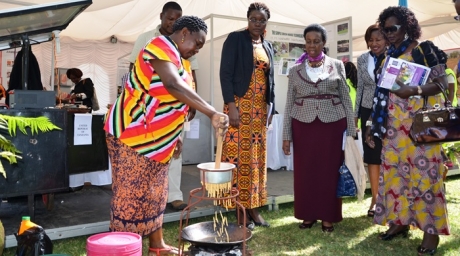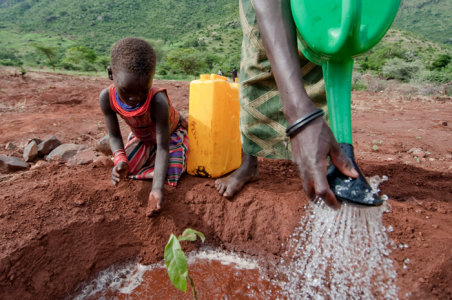Day 2 of Sharefair 2014 joined people all over the globe in the celebrating World Food Day. Presentations and speeches by high-level guests including the chair of the Committee on World Food Security (CFS) who underlined how to reduce rural poverty, improve food security, nutrition and health.
The CFS Chair also addressed the vital role of family farming, noting that smallholders in Africa are producing less than their potential because of lack of access and availability of agricultural inputs and fertilizers. Innovations, policies and practices that can support them are therefore needed to reach across all food systems. This involves connecting research to farmers especially women, providing new farming technologies and approaches and encouraging and promoting best practices for sustainable production and development.
The African Union (AU) commissioner for Rural Economy and Agriculture, alluded that agriculture and family farming cannot be successfully dealt with alone, instead it should be connected with wider issues of gender, youth and climate change relevant to the regions’ context; thus, a more complex challenge than just producing enough food. Of the total arable farm lands in Africa over 62% are family farms that number over 500 million. These farms contribute to more 56% of global agricultural production and rural women are at the center of this. Thus, empowering rural women is crucial for ending hunger and poverty.
Staff from the Gender Affairs department of the IGAD Secretariat, discussed women’s vulnerabilities to shocks and stress and the community based climate services for improved food security and resilient livelihoods. Smallholder farmers are said to be more vulnerable to the biophysical impacts of climate change like drought, disease, floods, pests, and unpredictable onset and cessation of rainfall. Women are likely to face these challenges and bear additional consequences that are socio-culturally driven such as restriction of movement and impacts of men’s absences from home due seasonal migration; insecure land rights and ownership, lack of education and the lack of information and access to climate or weather information. Many rural women spend their lives on farms they do not legally own, they labor in extreme poverty without access to financial services, clean drinking water, cooking fuel and basic sanitation, and yet they must every day ensure there is food in their household.
 Photo- Christian Mulumba/ UN Women via Flickr.
Photo- Christian Mulumba/ UN Women via Flickr.
Research – Policy – Farmer Linkages
The roundtable and panel discussion that followed brought leaders together with people from international organisations, research institute, grassroots farmer organizations, private sector, regional and national government, and civil society organisations to discuss the paradoxes and synergies that exist in linking research, policy & markets to the need of smallholder farmers in Africa.
Many raised the concern that there is a disconnect between research and local smallholder farming communities. The discussions and presentations generally agreed that empowering and investing in rural women has been shown to significantly increase productivity and therefore a necessary step toward reducing hunger and malnutrition and improved rural livelihoods not only for women, but also for households, communities, and nations. Research can only be meaningful to farmers when researchers work together with farmers from the research design, to analysis and implementation, inculcating the voices, needs and aspirations of farmers from the beginning as well as sharing the research feedback and result with the farmers at the end. The way research is done and conducted must be reformed in order to reach to farmers by allowing especially women to own and be part of the research and not just be data providers, thereby being gender responsive.
The integration of traditional knowledge with science was stressed to be a sustainable solution to ending hunger and poverty. Policies that encourage and promote the synergies between research, private sector development in innovation and agricultural technology was said to be key in finding and capitalizing on the synergies exist. African’s future and food and nutrition security can only be achieved if agricultural growth and transformation is promoted and supported for shared prosperity and improved livelihoods. Participants and all presenters alike were all urged to engage in the consultation currently underway on Africa’s future process.
What it takes to move from Innovation to a business at scale
Farming and all the supply management solution to reaching the farmers and establishing a system that encourages high and inclusive growth and development include Position Innovation, a means of taking out a proven market and making it widely available and disseminated; and the use of Paradigm Innovation- changing the whole process of doing things. The Private Enterprise Development Advisor, for USAID in Kenya commented that each actor has an idea and processes to make the system a success – to make the puzzles come together however complex the process may be yet no one actor has the solution, every actor has to participate and contribute to the entire value chain an innovative system. This process involves developing a common agenda with something for everyone to produce a win-win situation. Providing access to information to all-Inclusive partnership for collective impact; and the resources- different resources pulled together.
Agricultural innovation systems players includes
- Farmer groups leaders
- Extension services staff
- Agricultural researchers
- Input suppliers
- Local government officers
- Traders
 Photo- WFP/ Uganda via Flickr.
Photo- WFP/ Uganda via Flickr.
Factor that determine innovation growth are, most times limited to finance but besides this, business, organizational, and communications skills as well as partnership and networking skill were identified to be key to innovation growth which explains why over 75% of business start-ups in this sector fail. The presenter from USAID called on all entrepreneurs to take advantage of the international community’s partnership in fostering the course of agricultural productivity through innovation and technology.
The Sharefair ended with closing remarks from the office of the UN Women, Regional Director. “Africa has the potential to feed itself but we cannot eat potential, we must take every opportunity to advance and improve our agricultural productivity using the new wave of innovation and technology in Africa, at the centre of which are women and youth”.
This is a blog from days 2 and 3 of the Sharefair on Rural Women’s Technologies – Inspiring Agricultural Change: Improve Food Security, Nutrition, and Productive Family Farming in Eastern and Southern Africa”. 15 – 17 October, 2014, Nairobi Kenya.
This blog was written by Jummai Yila. Jummai is a Programme Officer at the African Forest Forum (AFF), Nairobi Kenya and she has researched gender, livelihoods, climate change adaptation, and natural resource management in many countries of Africa and Southeast Asia.